- Home
- Cynthia Lord
Because of the Rabbit
Because of the Rabbit Read online
Title Page
Dedication
Rabbits are crepuscular, most active at dawn and dusk.
A frightened rabbit can truly be scared to death.
If a rabbit refuses food, it can quickly become an emergency.
Most rabbits are happiest in bonded pairs or groups.
Rabbits are naturally curious. Once comfortable with their nearby environment, they’ll want to explore beyond it.
A pet rabbit’s diet should consist mostly of grass hay.
Rabbits are the third-most surrendered pets to animal shelters, behind dogs and cats.
Some rabbit pairs bond easily and others take a long time to become friends.
When a rabbit stretches toward you with its ears tipped forward, it’s curious and wants to share what you’re doing.
Rabbits have scent glands under their chins. They rub their chins on things to claim them as their own.
Rabbits don’t consider breed, age, or size when choosing a friend to bond with.
A bonded pair of rabbits that spends too much time apart will unbond.
Bonding rabbits isn’t always a smooth process. Sometimes a few steps forward is followed by a step backward.
Rabbits are territorial. Be careful and respectful when reaching into a rabbit’s space or you may be charged at or even bitten.
To offer grooming, hold your hand on the ground in front of the rabbit. If the rabbit accepts, he will come to you.
A rabbit will grieve the loss of a mate.
Rabbits have a blind spot in front of their nose. It’s the only place they can’t see.
Jackrabbits are actually hares.
Anything is possible with rabbits.
Author’s Note
About the Author
RULES Preview
Copyright
“A rabbit?” I heard Dad say into the phone. “Is he hurt?”
Mom sighed at the bowl of mashed potatoes in her hands. She likes it when all four of us can eat supper together, but when a Maine Game Warden gets a call, he has to go. Even if it’s suppertime and tomorrow is the biggest day of my life.
“How long’s the rabbit been there?” Dad asked.
Mom had made all my favorite foods—meat loaf, mashed potatoes, corn on the cob, and blueberry pie for dessert—but I was too excited to eat very much.
My older brother, Owen, leaned toward me. “Who’s ahead? Excited or Scared?”
I grinned. When we were little, whenever we had mixed feelings about something, Owen and I’d pretend those feelings were running in a race. We hadn’t done it in a long time, though.
“Excited is way ahead, but Scared is coming on strong,” I said.
Mom passed me the bowl of mashed potatoes. “I’m sure most kids feel that way on the night before school starts.”
I nodded, though we both knew I wasn’t “most kids.” Most kids went to school for the first time in preschool.
Or kindergarten.
Or maybe first grade.
Not many started in fifth. In fact, I was pretty sure I’d be the only fifth grader at Lakeview Elementary School who’d never gone off to school before.
It wasn’t that I hadn’t done schoolwork. I’d done plenty. My lessons had been at the kitchen table, though. Science experiments were done in the bathroom or on the front porch—in case they exploded or leaked. I read books on my bed or on the couch or even floating in a kayak on the lake in front of our house.
Being homeschooled had many good parts, but the best part had always been Owen. We made up games and shared secret jokes. We told each other stories and collected rocks together. When Owen did something, he’d ask me if I wanted to do it, too. Being four years apart didn’t matter.
Until last year.
Owen told Mom and Dad he wanted to see what public school was like. So he went to high school and was gone all day. He made new friends. Then he added after-school things like theater and playing right field on the baseball team.
What he subtracted was me. Mom said it sometimes happens as brothers and sisters get older, but I didn’t think it’d happen to us.
“Maybe Excited has marbles in her pocket,” Owen said. “And she drops them on the track so Scared will slip on them.”
I imagined Excited pulling a whole handful of marbles out of her pocket and dropping them one by one.
“Okay. Give me your address,” I heard Dad say. “Don’t touch him. I’ll be right over.”
As he put his phone in his pocket, Mom said, “Let me fix you a plate to take with you, Gabe.”
“Thanks, but just put it in the fridge,” Dad said, pulling on his green warden jacket. “I’ll warm it up when I get back. This shouldn’t take too long. A woman found a wild rabbit stuck between two wooden pickets in her fence. Guess he tried to jump through and only made it halfway. I hope I don’t have to take the fence apart. The lady is already fuming about being late for something.”
“Can I come?” I asked.
“But, Emma, I made all your favorite things,” Mom said. “And you haven’t eaten more than a few bites.”
“Thank you, Mom. I love it all, but my stomach’s too jumpy to eat.” I’d thought about school all summer, but now the big day was tomorrow. Little worries were creeping in. What if the other kids knew things that I didn’t? What if everyone already had their own friends and didn’t want more?
Scared jumped right over those marbles.
“I could pass you tools,” I called to Dad. “And the lady will probably be nicer with a kid there.”
He paused, his hand on the doorknob, and glanced back at Mom.
She sighed. “All right. We’ll save the pie for later. Don’t keep her out late, though, Gabe. She has to be up early.”
I bolted from my seat so fast that our golden retrievers, Molly and Maggie, started barking like there was an emergency.
“Aren’t you coming?” I asked Owen.
He shook his head. “I have to call Jordan. I’m hoping to convince him to try out for soccer with me.”
Soccer? When did he decide that?
“You can tell me all about it when you get home,” Owen said.
“I hope we can just wiggle the rabbit free,” Dad said as I caught up to him on the front porch. “But let’s bring something to put him in, just in case he’s injured. I’ve got a big plastic bin in the barn. That should hold him until we get to the rehab center.”
“A bunny in a box!” I said.
Dad smiled. “Rabbit wrangler. That’s my job.”
Animals are my favorite part of Dad’s job. If the rehabilitation center is already closed for the night, Dad might even bring an injured or orphaned animal home with him. Once I came downstairs to breakfast and found a fox kit sleeping in a box by the woodstove. Another morning Mom screamed when she went to put water in the coffeepot and there was a turtle with a cracked shell in a plastic tub in our kitchen sink. A beaver with a bad foot even slept in a cage in our barn one evening. Owen says we run a wildlife bed and breakfast.
Our dogs, Molly and Maggie, are used to it. They just give the newcomer a quick sniff and then accept it as belonging.
Sometimes Dad even lets me come with him to release an animal back into the wild. As soon as he opens the cage door or the box flaps, a look flashes into that animal’s eyes that I can’t explain. But it knows it’s free. Then there’s a rush of wings reaching for the sky or paws racing for the woods and it’s gone. The whole thing is over in seconds, but it’s the best moment ever.
The worst part of Dad’s job is when he catches someone breaking a hunting law. They might have to pay a fine, or even go to jail. Sometimes that conversation happens way out in the woods with no one else around, and the hunter is holding a gun.
Dad would never take me on a call like that, though. Only on quick, simple animal rescues. Like freeing a stuck rabbit from a picket fence and watching him hop away if he’s okay or helping him out if he isn’t.
I should’ve known better, though. Rabbits are tricksters. When I was little, I’d always begged my grandfather to tell me stories about Monsieur Lapin, Mr. Rabbit. “It happened once,” Pépère would start, and it was like the whole world slowed down to listen. I’d hang on his every word until Monsieur Lapin had cheated and sneaked his way through every near miss and danger.
Little, smart, fast as the wind on a mountaintop, and full of surprises.
Anything is possible with rabbits.
Pépère’s stories always began with the words “It happened once.” After that, each story took its own twists and turns, like a stream running this way or that way around the rocks, but it always ended with the words “So it was.”
When I was little and my grandparents were still alive, Owen and I used to visit Pépère and Mémère every summer at their house, half a day away up north in Quebec, Canada. Dad would drop us off and pick us up a few weeks later.
Even though Owen and I only ever lived with Pépère and Mémère when we visited, Mémère always greeted us with, “You’ve come home!” And she made it feel like home. I loved belonging there on the farm where Dad grew up.
In the early morning, Pépère would wake Owen and me, and we’d go out in the fields as the sun came up. By midmorning we’d have picked baskets full of vegetables or berries. Then we’d help Mémère bake things to eat and sell.
If I didn’t know how to use the sifter or how small to cut the strawberries, Mémère would say, “Watch.” She’d move her hands slowly so I could see every movement her fingers made.
At home, that would’ve felt like work, but it never did at Mémère and Pépère’s. As we picked and baked, Pépère would tell us stories. He knew the name of every wild animal in the woods and skies around the farm and spoke to them like friends. He called the animals and birds by their names in French, like Monsieur Castor the beaver, Madame Tortue the turtle, Monsieur Renard the fox, Monsieur Corbeau the crow, Madame Sittelle the nuthatch, and Monsieur Hibou the owl.
My favorite stories were about Monsieur Lapin, a cottontail rabbit who was always getting into trouble. Sometimes he’d trick his way out. Other times he learned a lesson. Those lessons never stuck too well, though. In the next story, he’d be back in trouble. None of the other animals held it against him. It was just who he was.
If a rabbit popped up in the vegetable rows, Pépère would say, “Bonjour, Monsieur Lapin!”
I asked Pépère once why he called every rabbit Monsieur Lapin, when really there could only be one. “Every rabbit has some of Monsieur Lapin’s magic,” he said. “Rabbit magic is a powerful thing.”
As Dad drove, I watched out the window and thought how tomorrow would be like the border crossing to Quebec—you drive through the checkpoint and there’s a whole different country on the other side. School would change a lot of things. There might be a whole different me on the other side of tomorrow.
I took a deep breath, the way Pépère always did, to pull a story inside me. “It happened once,” I said to Dad beside me in the truck. “Monsieur Lapin was running away from that sneaky fox, Monsieur Renard. He jumped through a picket fence and got stuck!”
Dad smiled. He grew up with Pépère’s stories, too. “Monsieur Lapin wouldn’t need a game warden to free him, would he? He’d trick Monsieur Castor into chewing the fence down with his sharp teeth.”
“Or he’d tell Madame Sittelle there were tasty bugs in the wooden pickets,” I said. “She and her nuthatch family would come and peck the fence apart, looking for them.”
Dad passed a Massachusetts car driving slowly in front of us. Local people call the road we live on “Moose Alley.” It’s a major road for us, connecting a small town with an even smaller one, right on the edge of the big woods stretching up to Canada.
On the roadside are brushy areas and marshes where moose like to graze. As it gets close to dark or very early in the morning, we get extra cars with out-of-state license plates. That’s the time the guidebooks tell you to go looking if you want to see Monsieur Orignal. I’ve seen moose at all times of day, though. Moose don’t read the guidebooks.
Moose Alley doesn’t even need a line painted down the middle, because you can drive the whole thirty miles of it, from town to town, and only meet a handful of cars and a few logging trucks. People from away call our part of Maine “the sticks.”
Which is true, I guess. We have no shortage of sticks.
Dad turned the truck onto a small dirt road cutting through the woods. It was mostly a camp road. A road you could drive right past and not even see it—but the kind of road where things always seem to happen in Pépère’s stories. I breathed in the Christmassy scent of pine and spruce through the open window.
“Okay, Em,” Dad said, turning on his headlights to see better. “Help me look for the house now. The lady said it was number sixty-three.”
At first, I thought he was kidding. There were hardly any houses, certainly not sixty-three of them, but there were a few numbers nailed to the trees and they seemed to jump ten or more at a time. As we passed each house or camp, I looked for bikes and toys—clues that a kid lived there. There were lots of things I was hoping for tomorrow at school, but making new friends was Number One—maybe I’d even make a best friend. I really wanted to be half of an “and,” like you see in books.
Calvin and Hobbes.
Frodo and Sam.
Charlotte and Wilbur.
Maybe we’d solve mysteries together. Or dress up as Thing One and Thing Two for Halloween. Or be copresidents of our own club. And we’d never miss each other, because we’d see each other every day at school.
I’d even made a list.
Emma’s Best Friend Checklist
Likes me best.
Likes the things I like.
Shares secret jokes.
Is always on my side.
Lets me be me.
Forgives me when I’m sorry.
I just wrote down everything I missed with Owen. It’s not that I didn’t have other friends—kids from church and homeschool group—but when you live in a place where the houses are far apart, it takes some planning to see other kids.
Owen had always been there. That’s what I missed most, just him being there.
And the worst part was that he liked school. Listening to all his stories, I couldn’t help wondering if I were missing out on something big.
“This must be it,” Dad said.
Up ahead was a clearing with a small gray house and a white picket fence out front. No bikes. No toys. Just an older woman outside holding a broom.
As we got out of the truck, she called to us. “I tried to poke the rabbit through, but he’s wedged in there tight.”
Poke him through? I disliked her immediately.
“Don’t touch him, ma’am,” Dad shouted back pleasantly. He has to be nice to everyone, unless they’re breaking the law. I guess there wasn’t an actual law about poking a rabbit with a broom.
Dad grabbed his toolbox from the back of the truck and gave me the plastic bin and lid.
As I got closer to the fence, I gasped. The rabbit certainly was stuck. His back feet and little puff tail dangled on one side, his head and front feet on the other.
But what shocked me was how small he was. And he wasn’t medium brown like a cottontail rabbit or rusty tan like a snowshoe hare in summer. He was a soft honey-gold color with a brown nose and front paws. He seemed to be frozen in fear, except for his little back rising and falling with each breath.
“Well, there’s a surprise,” Dad said. “Do any of your neighbors have a pet rabbit?”
The woman shook her head. “Not that I know of.”
Dad stroked his chin, thinking. “Look, I’m glad to free it, but as a game warden, I only deal wi
th wildlife. You’ll need to call your local animal control officer to come get this bunny. They handle pets.”
“How long will that take?” the woman asked. “I’m supposed to be at a meeting.”
“I can give you this bin to keep him in until animal control gets here,” Dad said, “but I can’t—”
“Let it hop back into the woods,” the woman said. “That’s where rabbits belong.”
“Not this rabbit,” I said. “He’s not wild.”
She shot me an angry look. “Well, he’s not my rabbit!”
I turned to Dad. “You know he doesn’t stand a chance in the woods. Not with all those foxes, lynx, and owls.”
Dad looked from the lady to the rabbit to me. “Well, there’s no need for him to suffer while we figure it out.” He leaned down and ran his fingers along the rabbit’s sides. “His ribs are too round to go forward, so let’s try easing him back the way he came. Em, take the bin and get behind him—but not too close to those hind legs. Even a little bunny’s got a kick.”
The bin was ridiculously huge for such a tiny rabbit.
“It won’t jump up and attack us, will it?” the woman asked.
I saw Dad trying not to smile. “I don’t think so, but maybe you’d like to go in your house, ma’am? Just in case. Emma and I are trained rabbit wranglers, but I can’t guarantee your safety.”
I bit the inside of my lip so I wouldn’t giggle. The woman didn’t look like she believed Dad, but she took some steps backward anyway.
The rabbit’s hind legs were hanging down limp on my side of the fence, but his little tail twitched. My hands were aching to touch him and see if he was as soft as he looked. But I didn’t want to scare him even more. “Don’t worry,” I said, sitting on the ground behind him. “We’re here to help you.”
Between the pickets, I watched Dad’s hands on the rabbit’s shoulders. “Come on. Don’t fight it,” he said, turning the rabbit gently. “You’re squeezed in here pretty good. It’s gonna take some work to get you out.”
The bunny’s hind legs started kicking, wiggling him a little more onto my side. “It’s helping!” I said. “He’s coming!”
“Good! Set the bin on its side so he’ll back into it,” Dad said. “Then, as soon as he’s inside, tip it upright, and throw the lid on.”

 Merlin
Merlin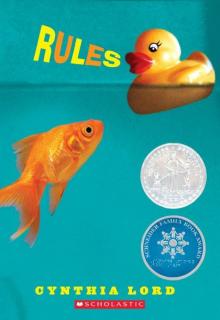 Rules
Rules Half a Chance
Half a Chance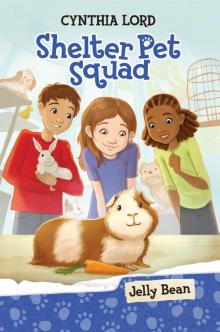 Jelly Bean
Jelly Bean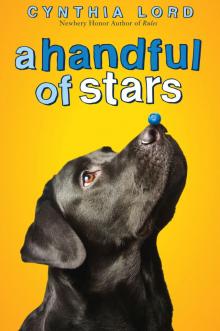 A Handful of Stars
A Handful of Stars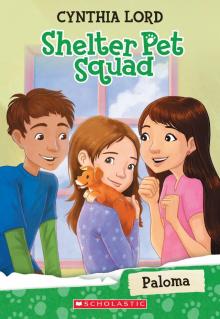 Paloma
Paloma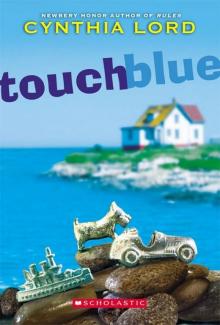 Touch Blue
Touch Blue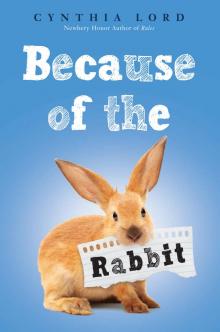 Because of the Rabbit
Because of the Rabbit